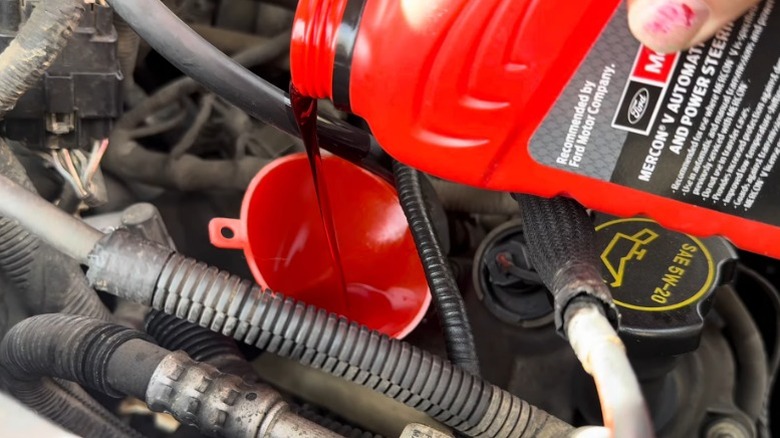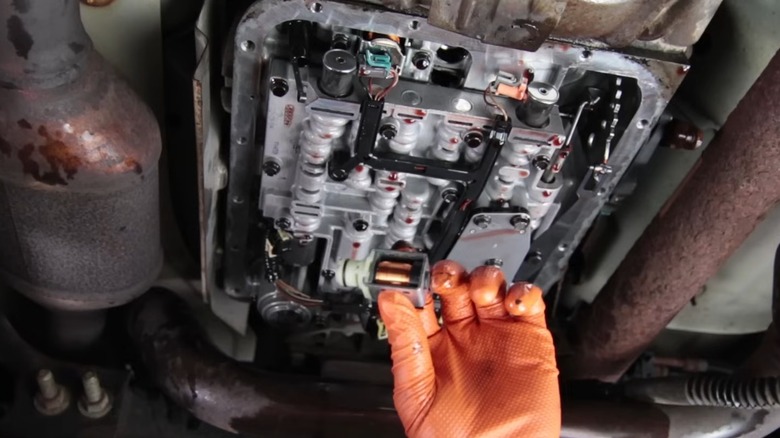The Most Common Cause For A Stiff Gear Shift, Explained
Automatic transmissions are impressive devices. They're made up of hundreds of individual components — like gears, clutch packs, and solenoids — that work together to scale engine power and help your car travel smoothly at different speeds. However, while modern transmissions or gearboxes are engineered to last for thousands upon thousands of miles, they are subject to wear and tear over time and require regular maintenance, including transmission fluid flushes, to keep them in solid operating condition. If you fail to care for your transmission properly, it can develop various forms of damage and lead to symptoms like hard or stiff gear shifts.
A stiff or hard shifting transmission can cause your vehicle to feel like it's lurching or jerking into gear. You may also experience delayed shifting, and other symptoms, like an overheating gearbox or the inability to shift into gear at all may follow. While various issues can cause stiff transmission gear shifts, one of the most frequent reasons for this problem is low or dirty transmission fluid.
Transmission fluid is a type of hydraulic fluid that your car's gearbox uses to generate hydraulic pressure to actuate gear changes, as well as provide lubrication. Like engine oil, transmission oil requires frequent inspections and replacements, and failing to keep up to date with these services can result in some pretty jarring gear shifts. If you're interested in learning more about how low or dirty transmission fluid causes stiff gear shifts, as well as some of the other potential causes of this problem, stick around. Here's what you need to know.
Low or dirty transmission fluid commonly causes stiff gear shifts
As mentioned, various issues can cause your transmission to shift hard. However, one of the most common causes of this problem is low or dirty transmission fluid. As a type of hydraulic fluid, transmission fluid provides hydraulic pressure to the gearbox to help actuate gear shifts. It also functions as a lubricant to prevent overheating and help all of the gears and other internal parts move smoothly. Like the other automotive fluids your car uses, transmission fluid requires regular maintenance. Depending on the type of vehicle you drive, you generally need to replace your transmission fluid every 30,000 to 100,000 miles.
If you fail to maintain your transmission fluid correctly, your gearbox can develop issues like stiff gear shifts. When the level drops too low, the transmission may be unable to shift properly due to low hydraulic pressure. However, if the fluid is contaminated and dirty, it can form clogs or blockages, preventing the gearbox from shifting correctly. When those conditions are met, your transmission will struggle to shift smoothly through the gears, potentially leading to issues like hard or stiff shifts, overheating, and more severe gearbox damage like the inability to shift at all.
Fortunately, if you care for your vehicle and its transmission properly, you should be able to avoid transmission fluid-related problems. Your gearbox is still likely to develop wear and tear as it ages. However, maintaining it properly will go a long way toward ensuring that the transmission lasts for many thousands of miles and preventing avoidable problems like stiff gear shifts.
What are some other causes of stiff gear shifts?
While low or dirty transmission fluid is one of the most common causes for stiff gear shifts, it's not the only potential cause of this problem. The hydraulic transmission fluid is a critical part. However, it's not the only key player inside your car's transmission. Other reasons for a stiff or hard shifting transmission include things like worn-out transmission solenoids, a damaged valve body, faulty transmission speed sensors, and, in the case of older vehicles, issues with the vacuum system.
Transmission solenoids are valves that facilitate and control the flow of transmission fluid through the valve body. These devices can experience electrical failures or become clogged over time or due to dirty transmission fluid, potentially resulting in problems like stiff gear shifts, and your car may even go into limp mode. The valve body is a complex network of fluid passages and is responsible for helping send pressurized hydraulic fluid to different areas of the transmission. If it experiences damage or becomes clogged by debris, you may experience hard shifts or notice your vehicle's check engine light appears on the dash.
Transmission speed sensors monitor the power entering and leaving the transmission. If these devices fail, the transmission control module (TCM) may be unable to make accurate adjustments, potentially resulting in stiff gear shifts. Finally, for older vehicles that rely on the vacuum system and a vacuum modulator valve to help make accurate gear switches, damage to the vacuum system or the modulator valve can result in problems like rough shifts. If you experience stiff gear shifts, you should check your transmission fluid. However, if the fluid is in solid shape, you should consider getting a professional inspection to identify the root cause accurately and fix the problem properly.


